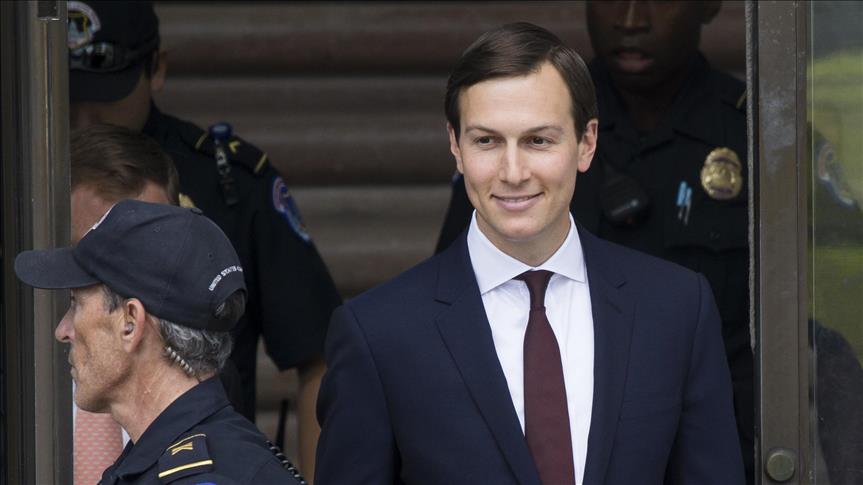 WASHINGTON, USA - JULY 24: Jared Kushner, son-in-law and Senior Advisor to President Trump, leaves after testifying before the Senate Intelligence committee in a closed door session on his alleged contacts with Russia at the U.S. Capitol in Washington, USA on July 24, 2017. ( Samuel Corum - Anadolu Agency )
WASHINGTON, USA - JULY 24: Jared Kushner, son-in-law and Senior Advisor to President Trump, leaves after testifying before the Senate Intelligence committee in a closed door session on his alleged contacts with Russia at the U.S. Capitol in Washington, USA on July 24, 2017. ( Samuel Corum - Anadolu Agency )
By Michael Hernandez
WASHINGTON
President Donald Trump's son-in-law told lawmakers he did not collude with Russia during a closed-door testimony Monday.
Jared Kushner's prepared remarks were published early Monday ahead of his testimony before the Senate intelligence committee.
The Senate panel, its House counterpart and the FBI are conducting separate investigations into what U.S. intelligence officials have called a Russian "influence campaign" aimed at tilting last year's election in Trump's favor, and whether his campaign participated in the effort.
"I did not collude, nor know of anyone else in the campaign who colluded, with any foreign government," Kushner, who is a special advisor to Trump, said in his 11-page testimony. "I had no improper contacts."
The comments follow the disclosure by Trump's eldest son, Donald Trump, Jr., that he and Kushner participated in a meeting at Trump Tower with a Russian lawyer who offered to provide the campaign with damaging information regarding Trump's Democratic challenger, Hillary Clinton.
Trump Jr. published the June 2016 email chain that led to the meeting, disclosing that the lawyer, Natalia Veselnitskaya, offered to provide the allegedly incriminating information to the campaign.
Kushner testified he arrived to the meeting a "little late", and when he arrived the discussion centered on adoptions of Russian children prompting him to determine "the meeting was a waste of our time".
He also denied reports he sought a "secret back channel" with Russian President Vladimir Putin, saying instead his efforts to establish a communication line with Russia were focused on improving ties and addressing Syria's "ongoing humanitarian crisis".
After telling Russia's former U.S. ambassador Sergey Kislyak he did not have access to a secure line during the presidential transition, he asked Kislyak if he could use one at the Russian embassy.
"The Ambassador said that would not be possible and so we all agreed that we would receive this information after the Inauguration," according to his published remarks. "Nothing else occurred. I did not suggest a 'secret back channel.' I did not suggest an on-going secret form of communication for then or for when the administration took office."
Kushner maintains he was seeking a communication line with Russian officials after the election is evidence he did not know of one beforehand.
"The fact that I was asking about ways to start a dialogue after Election Day should of course be viewed as strong evidence that I was not aware of one that existed before Election Day," Kushner said.
He also confirmed a meeting with Sergey Gorkov, the Chairman of Vnesheconombank. The Russian government-owned lender is under U.S. sanctions, but Kushner said "there were no specific policies discussed", including sanctions.
Addressing reporters at the White House after leaving Capitol Hill, Kushner said that suggesting Trump won because of Russian interference "ridicules those who voted for him.
"Donald Trump had a better message and ran a smarter campaign, and that is why he won," he said in brief remarks.
Kushner will testify Tuesday before a House panel.








